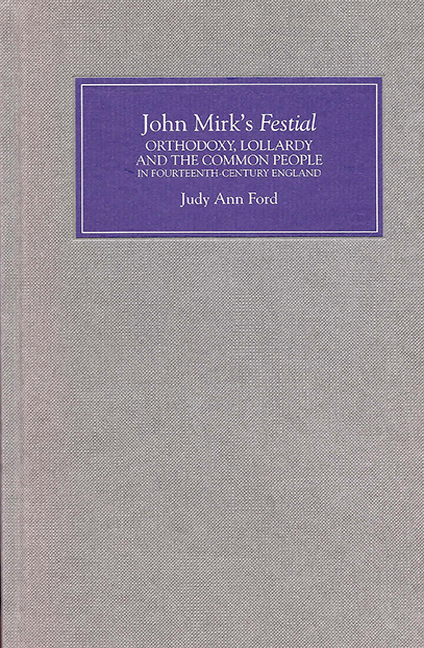Book contents
- Frontmatter
- Acknowledgements
- Contents
- Introduction: John Mirk's Festial and Fourteenth-Century England
- 1 Popular Culture and the Study of Late Medieval Piety
- 2 Clerical Power and Lay Agency
- 3 Secular Authority and Rebellion
- 4 Biblical Authority and Oral Tradition
- Conclusion: The Festial and Popular Piety in Late Medieval England
- Bibliography
- Index
4 - Biblical Authority and Oral Tradition
Published online by Cambridge University Press: 11 May 2017
- Frontmatter
- Acknowledgements
- Contents
- Introduction: John Mirk's Festial and Fourteenth-Century England
- 1 Popular Culture and the Study of Late Medieval Piety
- 2 Clerical Power and Lay Agency
- 3 Secular Authority and Rebellion
- 4 Biblical Authority and Oral Tradition
- Conclusion: The Festial and Popular Piety in Late Medieval England
- Bibliography
- Index
Summary
‘Blessyd pepyll of Goddys mowth …’
(‘Blessed people of God's mouth …’)
John Mirk, sermon for the Feast of St StephenThe Festial and Biblical Authority
Mirk advocates the use of the English vernacular as a medium of religious expression, a position that was still considered orthodox at the time of the Festial's composition, but one that distinguished him sharply from England's most conservative defenders of orthodoxy during the late fourteenth century, a time when the vernacular was becoming increasingly associated with Lollardy. The core of the dispute over the propriety of vernacular religious texts lay with the question of whether the Bible should be translated into English. The ideal of widespread access to the scriptures, combined with a bibliocentric version of Christianity, was a staple of Lollard ideology. Although he shared their advocacy of English, Mirk's position on the scriptures places him in stark opposition to them. Just as the Festial encourages the exercise of lay agency within orthodox ecclesiastical channels and offers compassion for the troubles of the oppressed within existing structures of secular lordship and governance, it stresses the importance of lay understanding of religion while discouraging attempts to acquire that understanding through reading the Bible. The version of Christianity found in the Festial, far from being bibliocentric, privileges oral tradition over written texts. This view of Christianity, while supporting the orthodox church of Mirk's day, also offered a model of the church that may have been seen as attractively inclusive by the illiterate and marginally literate, who, in all likelihood, comprised the majority of the congregations to whom the Festial was preached.
The great divide between the orthodoxy of the Festial and Lollardy lay in their interpretation of the authority of the Bible as the foundation of Christian truth. David Aers explains the opposing positions eloquently: according to Wyclif, Christians can ‘discover the necessary knowledge about Christian discipleship from Scripture independent of its interpretation and articulation within the church, articulation that includes liturgy, exegesis, and oral tradition.’ According to orthodoxy, in contrast, one learns about Christianity
by living as a Christian in the Roman Church, the spouse and body of Christ.
- Type
- Chapter
- Information
- John Mirk's FestialOrthodoxy, Lollardy and the Common People in Fourteenth-Century England, pp. 113 - 142Publisher: Boydell & BrewerPrint publication year: 2006



